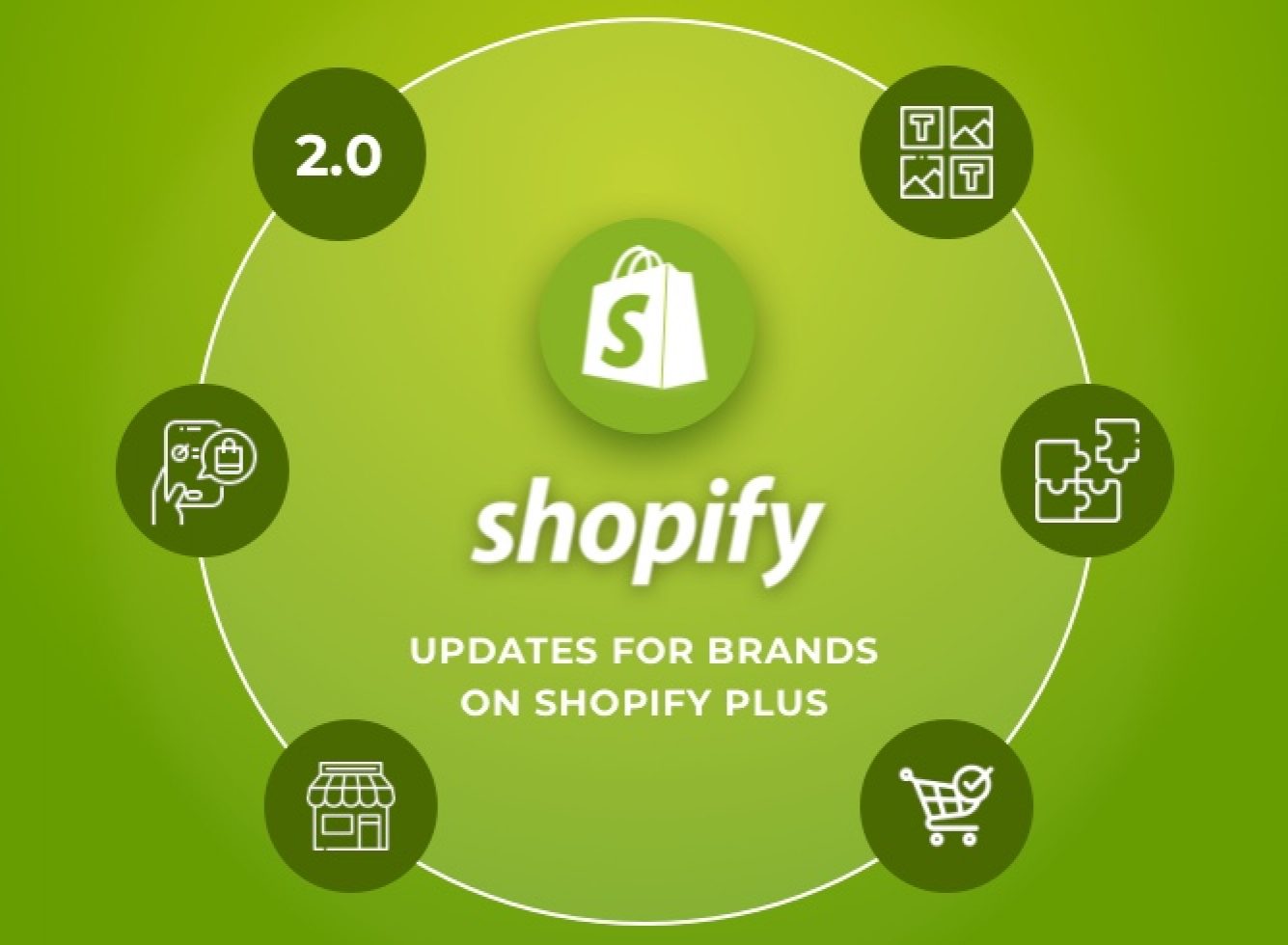Shopify Unite 2021: Exciting Updates for Brands on Shopify Plus

At the Shopify Unite 2021 partner and developer conference, Shopify introduced its largest ever set of infrastructure enhancements and innovations. Among these exciting updates, were a raft of improvements designed to support Shopify Plus development. These will provide merchants with even more extensive customisation capabilities than ever before.
One of the key announcements for Shopify Plus users is the launch of Online Store 2.0. This is one of the biggest updates to the online platform in its history, delivering a range of new features. This includes advanced developer capabilities, empowering Shopify Plus brands to provide unforgettable customer experiences. Read on to learn precisely how these new developments can benefit your Shopify store.
Shopify Plus Development: An Endlessly Customisable Platform
Shopify’s recent announcements have included a dizzying array of new features, functionalities, and innovations. To help explain these, the following section discusses each of them in turn.
Online Store 2.0
Online Store 2.0 is the biggest and most far-reaching innovation announced at Shopify Unite 2021. This update includes numerous novel functionalities, allowing Shopify vendors to customise stores to a much greater extent. You will also have more fine-grained control over the layout and aesthetics of your website. All of this will be accomplished via the new streamlined suite of user-friendly developer tools that Online Store 2.0 contains.
Online Store Customisation with Sections & Blocks
Another powerful innovation that is being rolled out is the new ‘sections and blocks’ interface. This update enables store owners to drag and drop whole sections of content (including videos, products, and images) within the theme editor. Blocks are even smaller components that you can move around within sections.
Blocks and sections provide advanced levels of personalisation and customisation without having to use code. Shopify vendors can exercise greater control by using them on Home Pages, landing pages, product pages, and collection pages. All you need to do is utilise an expert Shopify developer to update your themes to Online Store 2.0 before experiencing the full range of benefits.
Display Store Content with Metafields
Data and content are the essential building blocks of your store. With the introduction of metafields, Shopify has made significant improvements to the way they’re stored and managed. Metafields are essentially additional pieces of data that you can attach to other data. Storeowners can now define and edit metafields in the admin panel, and connect these to apps or chosen themes.
Metafields provide greater flexibility to gather and present data that is relevant to your brand. They can be used to offer additional product information on your store, creating a richer customer experience. Additionally, simple product and variant configuration – such as indicating the colour options for different products – can be easily done on a product page.
The new ‘file picker’ and ‘files API’ functions also provide sophisticated content management and display options. Theme developers will quickly be able to update a Shopify Plus user’s theme for all these advantages.
Hassle-free Integration of App Blocks Inside Themes
Shopify Plus brands will soon be able to hire developers to set up apps for theme integration. This new feature, ‘App Blocks’, will allow you to implement this integration without having to use any coding at all. What’s more, you’ll be able to manage these apps directly through the theme editor. This will allow you to uninstall them as you please without experiencing any performance issues.
Leverage Shopify Theme Development
Shopify is rolling out an exciting range of new development tools to assist theme building and provide further flexibility. For example, the Shopify GitHub integration is an updated Shopify CLI tool. This enables you to work with native support for version control, thereby facilitating safer collaboration.
In addition to this, Shopify is launching its first open-source reference theme: Dawn. It is designed to run 35% faster than the most popular theme and is completely mobile-optimised. Dawn also makes full use of the new features introduced in Shopify Online Store 2.0.
Shopify Plus Development: Increase Conversions
Shopify has also developed a number of updates specifically designed to increase conversions. Read on to discover the new features, which will help increase your revenue.
Shopify Custom Checkout
Vendors will be able to personalise Shopify checkout pages with apps created from checkout extensions. These apps will be easy to use, quick to install, and will safely upgrade as new features are launched for them. Moreover, they will be compatible with Shop Pay and other new payment methods.
Another exciting development is the post-purchase checkout extension, which is currently available in beta. This feature allows developers to create apps that deliver content to buyers after they’ve made a purchase. The post-purchase checkout extension fully integrates with Shopify and will remain compatible with all future updates to the platform. It’ll be an asset to growing your businesses, through upselling, surveys, and promotional offers, among many other tactics.
Shopify Scripts & Payments Platform Provide Customers with More Options
Shopify Scripts is a feature that only Shopify Plus brands have access to. It enables vendors to do things like customising shipping options or payment methods in the checkout. This Shopify customisation provides incredible flexibility, allowing you to offer curb-side pick-ups to customers in a given radius, for example.
Customers will also benefit from the additional payment options that you can offer them through the new Payments Platform. This feature allows payment providers to build new integrations into Shopify, creating opportunities for growth in emerging industries. Ultimately, this will lead to a vast ecosystem of payment gateways offering targeted functionality. This, in turn, will empower merchants to sell to more people in more places.
Buy Now, Pay Later: Increase Your Average Order Value
When given the flexibility to check out with larger shopping baskets, your customers will, on average, purchase more, thus increasing your average order value. Shopify’s new Shop Pay Instalments feature helps you to do just this by allowing customers to buy now and pay later.
Specifically, your customers will have the option of splitting their purchases into four interest-free payments. These won’t include any additional, hidden, or late fees. Shopify merchants can currently offer this on orders between $50 and $1,000, including taxes and shipping costs.
Scale Your Company with Ease
Shopify Unite 2021 also included a number of developments that will excite merchants who are looking to scale their business. The following developments will all be useful to fast growing brands.
Handle Flash Sale or Product Drop with Ease
Shopify Scripts are perfect for scaling by successfully processing the enormous volumes of traffic generated by even the biggest flash sellers. Advanced Scripts codes can even function in less than five milliseconds. This will allow you to offer sophisticated, unique, and unforgettable brand experiences as part of your sales events.
Provide Original and Distinctive Buyer Experiences
Shopify Plus brands will really stand out with the memorable experiences they offer through the platform’s powerful tech stack. Shopify’s Storefront API update allows merchants to design custom storefronts with advanced ecommerce capabilities. At the same time, you will still be able to create non-Liquid custom storefronts with the developer frameworks you currently use.
Another ground-breaking development is the introduction of Shopify Hydrogen. This new React framework simplifies custom Shopify storefront creation, empowering you to build much faster. On top of this Shopify Oxygen also enables merchants to host Hydrogen storefronts directly on Shopify. This is achieved in a manner that is ultra-fast and global, thus delivering powerful ecommerce experiences.
Provide Next-Level Local Pickup Experiences
Shopify merchants can now offer more sophisticated pickup experiences by identifying pickup only locations. By allowing customers to collect their order from these locations, you can reduce errors and avoid shipping from there. Items at these pickup-only sites will not be marked as “available” for online shipping, thereby simplifying your operations.
Begin Selling Your Merchandise Wholesale
Shopify has now launched Handshake, a marketplace that streamlines the process of selling your products wholesale. Any Shopify Plus brand can join Handshake, set prices, and distribute catalogues directly through the admin dashboard. You will not be charged a fee to join or pay any commission on sales. All suppliers are vetted by Shopify, and buyers must provide a reseller ID.
Find New Products to Offer Your Customers
Both online-only retailers and brick-and-mortar stores can benefit from Handshake, by enriching their catalogues with rare and distinctive products. With a personalised product recommendation feature, Handshake helps members to continually find interesting new products. Each brand featured on Handshake is handpicked to ensure that the highest quality is maintained.
Shopify Unite 2021: Driving Global ecommerce
The updates introduced at Shopify Unite 2021 are investments in the future of ecommerce. They will empower merchants and companies to build unique, impactful, and memorable online experiences.
Check back for more Unite 2021 updates.





